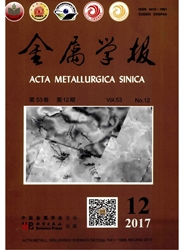

 中文摘要:
中文摘要:
采用电化学极化曲线测试、EIS测试、裂纹扩展实验和SEM分析研究了X80管线钢在鹰潭土壤溶液环境下的应力腐蚀开裂(SCC)裂纹扩展行为及机理.结果表明,X80管线钢在酸性土壤环境中的裂纹扩展速率随着外加电位的降低呈现增加趋势,相较于开路电位下的裂纹扩展,在裂纹扩展初期,-850 m V下裂纹扩展速率较大,而在裂纹快速扩展阶段,过保护电位-1200 m V下裂纹扩展速率更大;同时X80管线钢在酸性土壤环境中的SCC裂纹扩展机制也随着施加外加电位的不同而改变,在外加电位高于-930 m V时为阳极溶解与氢脆的混合机制,负于-930 m V时则为氢脆机制.
 英文摘要:
英文摘要:
Stress corrosion cracking (SCC) in soil environments is one of the major failure and accident causes for oil and gas pipelines, which have induced hundreds of damages all over the world, resulting in serious economic losses and casualties. Previous study showed that acidic soil environments in Southeast of China are highly sensitive to SCC of pipeline steels. However, there is less research on the behavior and mechanism of growth behavior of SCC in this environment up to date. SCC behavior and mechanism of X80 pipeline steel in thesimulated solution of Yingtan in China was investigated with electrochemical polarization curves, EIS, slow-rate- loading crack-growth test and SEM. Results showed that the applied polarization potential played an important role in SCC growth behavior and mechanism of X80 pipeline steel in the simulated solution of the acid soil environ- ment. With the decreasing of the applied potential, the crack propagation rate increased constantly. In comparison to the crack propagation at the open circuit potential, the cracks extended faster in the initial stage of crack propaga- tion when the applied potential was -850 mV; nevertheless, in the rapid propagation stage, the rate of the propaga- tion was magnified with the application of- 1200 mV potential. In addition, the crack propagation mode varied with applied potentials: it was mixed-controlled by both anodic dissolution (AD) and hydrogen embrittlement (HE) when the applied potential was more positive than -930 mV, and only in control of HE when the potential was less than -930 mV.
 同期刊论文项目
同期刊论文项目
 同项目期刊论文
同项目期刊论文
 期刊信息
期刊信息
